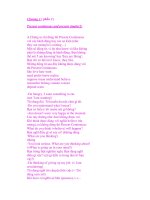Present Simple and Present Continuous pot
Bạn đang xem bản rút gọn của tài liệu. Xem và tải ngay bản đầy đủ của tài liệu tại đây (159.4 KB, 5 trang )
Present Simple and Present Continuous
'I surf / I am surfing.'
Sự khác nhau giữa thì "Thì Hiện tại Thường" và "Hiện tại Tiếp diễn là gì"? Sử
dụng chúng như thế nào?
Chúng ta dùng
Thì Hiện tại Thường khi chúng ta muốn nói về những thói quen
hay công việc hàng ngày - những thứ mà không thay đổi.
Chúng ta dung Thì Hiện tại Tiếp diễn để nói về những hành động đang diễn ra tại
thời điểm
nói, nhưng sẽ kết thúc nhanh.
So sánh 2 câu sau:
• (present simple) I play tennis.
• (present continuous/ progressive) I am playing tennis.
(present simple) ‘I play tennis’ cho chúng ta biết rằng người nói thường chơi
tennis. Not là một phần của thói quen. Chúng ta có thể gọi đó là tình huống lâu
dài.
(present continuous/ progressive) ‘I am playing tennis’ cho chúng ta biết rằng
người
nói đang chơi tennis ngay tại thời điểm này. Trận đấu sẽ sớm dừng lại.
Chúng ta gọi là tình huống tạm thời.
With the
present simple we use:
I play tennis
You play tennis
We play tennis
They play tennis
He/she/ it plays tennis.
With the
present continuous we use:
I am playing tennis
You are playing tennis
We are playing tennis
He/she/it is playing tennis
Trạng từ tần suất thường dùng với Thì Hiện tại Thường.
With the
present simple we use these frequency adverbs:
(Notice that the adverb comes before the main verb in the sentence.)
Always: ‘I always read before I go to bed.’
Often: ‘Her sister often comes shopping with us.’
Frequently: ‘Michael frequently visits his family.’
Sometimes: ‘You sometimes go to the gym, don’t you?’
Occasionally: ‘It occasionally rains in summer.’
Seldom: ‘They seldom ask for help.’
Rarely: ‘He rarely goes out without his backpack.’
Hardly ever: ‘I hardly ever eat pizza.’
Never: ‘Japanese people never wear shoes inside.’
Cụm trạng ngữ dùng với Thì Hiện tại Tiếp diễn.
With the
present continuous we use these time expressions:
(Notice that the time expression can come at the start or at the end of the
sentence.)
At the moment: ‘I’m watching TV, at the moment.’
These days: ‘Paul’s living in Cardiff, these days.’
Now: ‘What are you doing, now?’
Nowadays: ‘I think you are smoking too much, nowadays.’









